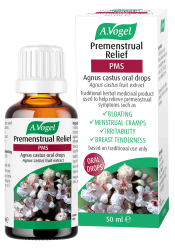An introduction to sore breasts and PMS
Sore, painful breasts is medically known as mastalgia. Symptoms can range from a feeling of heaviness, tenderness to touch, swelling and short sharp stabbing pains, or most commonly, a combination of all of these.
Cyclical mastalgia is when breast pain occurs regularly before each monthly menstrual bleed, disappearing with the onset of your period. It may be one of the symptoms experienced with PMS.
Breast tenderness can be a worrying condition for any woman. If you are concerned about your symptoms, or notice changes to your breasts such as a feeling of irregularity, lumpiness or a discharge from one or both nipples, speak to your doctor to rule out any serious underlying causes of your breast pain.
Why does PMS cause sore breasts?
The reason why PMS can lead to such a wide range of symptoms is not yet fully understood. Neither is our understanding of breast pain complete.
What is known, however, is that changing levels in hormones in the week or so leading up to your period can affect your breast tissue. During this premenstrual phase, levels of the hormone progesterone rise, causing your breast tissue to swell and become tender.
Additionally, you are more prone to water retention during this time of your monthly cycle. Apart from causing you to feel bloated, fluid retention can increase your bra size and add to breast tenderness.
It is also thought that increased stress levels can make you more prone to developing sore breasts, as well as worsening any other symptoms you may have.
What can I do to help myself?
There are several techniques women can try to help ease breast pain:
- One of the most effective is finding a bra which is the correct size and comfortable. Some women find that resorting to a sports bra while suffering from PMS helps. Others find that they have to increase their bra size in the lead up to their period, as their breasts swell as well as becoming tender
- As breast pain may be associated with water retention, it is important to keep well hydrated and to avoid fatty and salty foods. Flax seed is a source of fibre which is often used to reduce the symptoms of water retention, and including it in your meals may prove to be beneficial. You should not cook it, however, as it will lose its effectiveness. Some women also find that gentle exercise helps to reduce the symptom, as this also plays a role in avoiding water retention
- Keeping stress to a minimum is important for your general wellbeing, as well as for reducing PMS symptoms. Finding methods to cope better with stress can simply reduce the impact of other symptoms.
Are there herbal remedies to help me?
As PMS is at the root of the problem, the best approach is to start by tackling the underlying issue.
Agnus castus is a herb which has been long established as a treatment for general PMS symptoms. It works at the hormonal level, getting the female hormones into a better balance. It has been used to help with a variety of physical symptoms including breast pain, bloating and painful periods, as well as psychological symptoms such as irritability, mood swings and being more prone to stress.
Hence, Agnus castus is particularly suitable if your breast pain is one of a number of other PMS symptoms. It is particularly popular in women who wish to avoid the use of prescribed medicines, such as the contraceptive pill, when treating PMS.
If you are already using hormonal treatment such as oral contraceptives or HRT, speak to your doctor first as Agnus castus may not be suitable for you.
What about conventional medicines?
Your doctor may recommend the use of painkillers or anti-inflammatory medicines to help with breast pain, especially if it is associated with period pains. Usually, those available without a prescription will suffice, although if symptoms are severe, you may require stronger medicines available only on prescription.
If these are not sufficient, your doctor may then recommend the use of hormonal medicines such as the combined pill. These work by stopping ovulation and in this way, allows you to control your menstrual cycle.
My PMS Journal
Keep track of your symptoms with our PMS Diary to identify patterns & help discover ways to minimise them.








